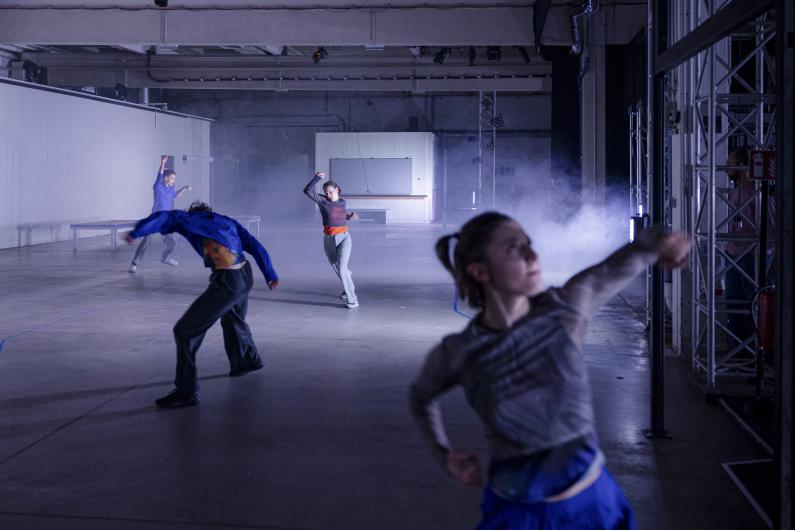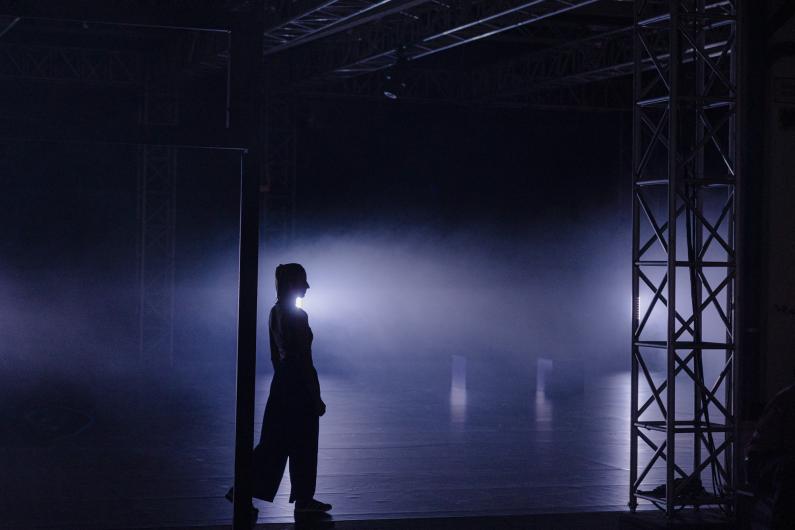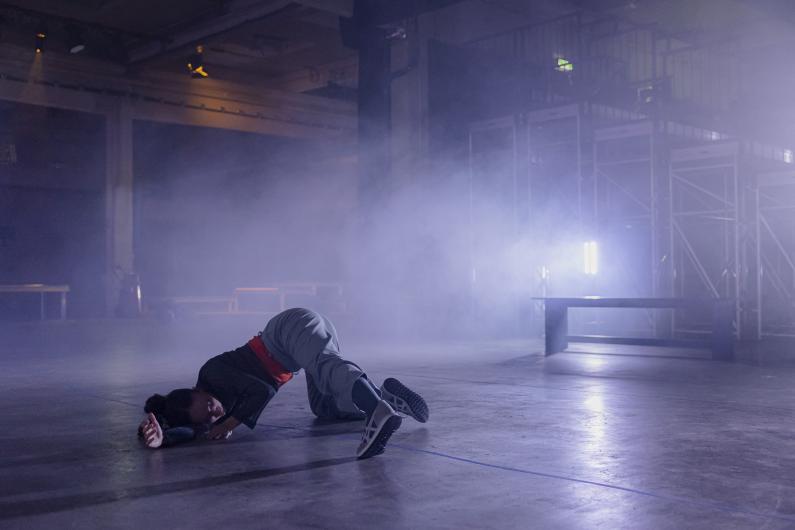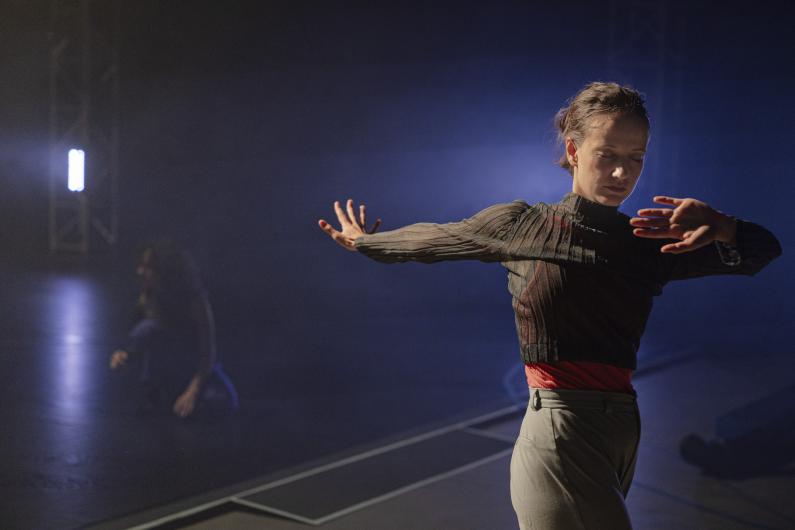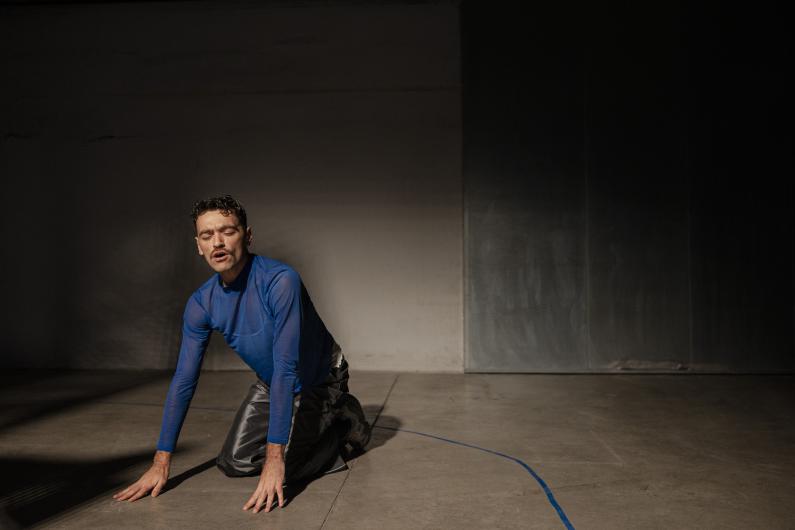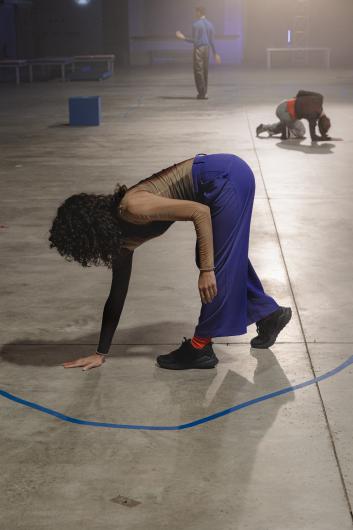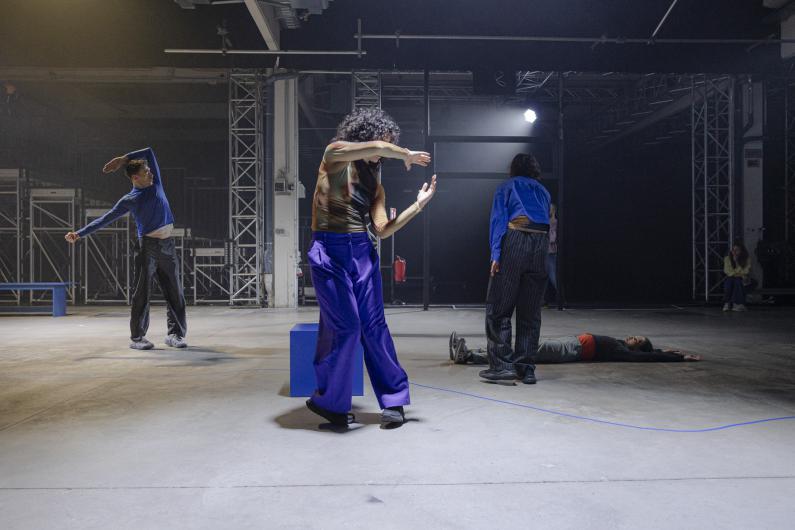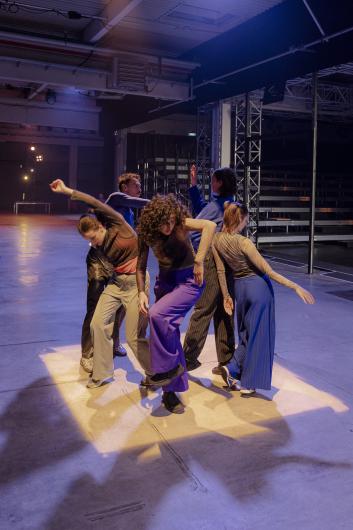varukt | Inge Gappmaier
now
Since the introduction of Universal Time in 1884, clocks all around the world have ticked almost synchronously. In contrast, humanity’s relationship to its own living environment has gotten increasingly out of time. In Inge Gappmaier’s performance now, alternating between measurable time and perceived time, the poetry of bodies intensifies as it gets more and more entangled with an immersive sound to create aesthetically charged emotional and receptive spaces. The audience is invited to freely move through now and track their own sense of time.
In her dance performance installation now, Inge Gappmaier allows the audience to feel moments in time as units of space. Focusing on the specific experience of our present, the piece understands the now not as a volatile moment on a linear timeline but as a permanent state of definite duration. In a suspenseful, multi-dimensional walk-in universe of sound and movement, five dancers feel their pulses and accumulative moments of their times in overlapping solos, searching for where the technical timescale gets inscribed in someone’s self-conception. The now becomes a global turning point, a moment to articulate emotions and the only space for reception and agency. we. here. now.
Inge Gappmaier works as a freelance choreographer, dancer, dance educator, dramaturge and dance scholar. In various artistic formats, she examines the contemporary understanding of the human body between poetry and socio-political structures. Inge studied choreography and performance at the Institute for Applied Theatre Studies in Gießen and contemporary dance education at the Music and Arts Private University of Vienna. She received various scholarships, teaches amateurs and professionals, and is active in matters of cultural policy. In international collaborations, Inge Gappmaier has presented her work, among other places, at brut Wien, Kosmos Theater, Kubus EXPORT, Tanzhafenfestival Linz, Plesni Teater Ljubljana, and the Albanian Dance Meeting. www.ingegappmaier.at
Su Huber mainly moves within dances and choreographies - having recently attended BA Classical | Contemporary Dance | Choreography at MUK Vienna (AT) and at DDSKS Copenhagen (DK). Propelled by un:doings, by voids and grotesque relations, theory and practice appear as reciprocal in their approach. Currently immersing themselves in MA Gender Studies at University of Vienna (AT). Su takes pleasure in accessing ideas in their embodied form. The work within the co-founded collective zone.2027, ongoingly encourages them to challenge to the monsters within.
Lea Karnutsch studied contemporary and classical stage dance at the Music and Arts Private University of Vienna. She has performed as a dancer at Theater an der Wien and Kultursommer Wien and shown her own choreographies at Stadttheater Augsburg, at DOCK 11 in Berlin, and in Ankara. In 2019, she received the Austrian Art Award from a jury headed by Christian Ludwig Attersee for her piece Vacuity. In addition to collaborating with Austrian and international choreographers such as Nikolaus Adler and Liz King, she is studying in Salzburg to receive her master’s degree in music and dance studies. Since early 2021, she has been developing stage pieces combining dance, music, digital art, and installation art with musician and media artist Ferdinand Doblhammer. For this purpose, the couple have established the association Flip the Coin.
Sara Lanner is a choreographer and visual artist based in Vienna. In her works, she negotiates questions of cultural and (bodily) linguistic identity and explores spaces between trust and dependency. The ambivalences of interpersonal relationships and their points of contact as well as our material and ecological realities form the beginning of her artistic reflections. Most recently, her dance performance WEAVING INFRASTRUCTURES (2024) was shown at brut Vienna as well as Mining Minds (2021/2022) at ImPulsTanz festival. For her performance MINE (2021), Sara Lanner was awarded the H13 Niederösterreich Prize for Performance. Other venues to show her work included Tanzquartier Wien, Kunstraum Niederösterreich, Galerie 5020 Salzburg, Stadtgalerie Salzburg, MIPAF Macau/China, HART House Hongkong, Künstlerhaus Nuremberg, OK Offenes Kulturhaus Linz. www.saralanner.com
Luan de Lima studied classical and contemporary dance in Brazil and worked there with various choreographers. He then moved to Austria to continue his studies in contemporary dance and performance at SEAD in Salzburg. Since 2016 Luan is based in Vienna and works as freelance dancer. He has had the opportunity to be part of works from helene weinzierl/CieLAROQUE (AT), Lisa Magnan (FR), Cie. Willi Dorner (AT), Anton Lachky Company (BE), Mirjam Sögner (AT/DE), Renae Schadler (AU/DE) and others. In his own projects, Luan collaborated with Anna Swagerman in Blueprint (2022), with Sarai Vangelli Bereavement (2021), with Mzamo Nondlwana in Room no. 24 (2016) and with Matan Levkowich in Boys don’t cry (2015). He also did a co-production of CieLAROQUE and TanzHouse Salzburg for his solo The egocentric (2018). www.luandelima.com
Melina Papoulia is a performer and choreographer. In 2021 she completed her studies in Contemporary and Classical Dance at MUK Vienna and is currently studying for a Master's degree in Art and Cultural Studies at the University of Applied Arts Vienna. In 2022 she took part in the choreographic training programme ATLAS by ImPulsTanz. Since 2022 she has been working as an assistant director at Schauspielhaus Wien.
Mira König studied stage design at the Academy of Fine Arts Vienna, graduating in 2014. During her studies, she created works for theatre and film in collaboration with the Max Reinhardt Seminar and the Vienna Film Academy. In the season 2015/16, she was a permanent stage design assistant at the Deutsches Theater Berlin and was responsible for the stage design of the production Das Feuerschiff during her time there. Mira König has been working as a freelance stage and costume designer since 2017. Her work has taken her to Volkstheater Wien, Theater Drachengasse, Werk X Petersplatz, Landestheater Linz, Vorarlberger Landestheater, Theater Freiburg, Staatstheater Nürnberg and the Tiroler Landestheater, among others. For her stage and costume design for the family play Vevi (by Erica Lillegg, directed by Bérénice Hebenstreit) at Vorarlberger Landestheater, she was awarded the Stella*20 Performing Arts Prize for Young Audiences in the Outstanding Set Design category. www.mirakoenig.com
Robert Läßig and Inge Gappmaier have worked together for many years, starting at the Institute for Applied Theatre Studies in Giessen, and he also completed guest semesters in stage design at the HfG Offenbach, directing at the ZHdK Zurich and computer science at the THM Giessen. One focus of his work today is the exploration of the relationship between digitality and theatre. In a performative and theatrical context, he works as a lighting, video and interaction designer, with sensors, soldering irons, microcontrollers and source code. Robert Läßig was involved in productions at the Prague Quadrennial and the Treibstoff Theatertage. He recently worked with the composer Martin Grütter, the director Miriam Götz and the directing collective F.Wiesel, as well as a robot operator for Uncanny Valley by Rimini Protokoll.
In his art, Christian Schröder aims at making sound and composition comprehensible and more comprehensive in different media. As a student he was already interested in inter-disciplinarity and attended various schools for sound/media art, conceptual art, composition, and electronic music. Since his graduation in 2010, he has been working as a sound artist in visual art and as a composer and musician in the performing arts. Outside of his solo performances, which often feature algorithmic composition/improvisation, he likes to collaborate with artists from various genres, such as Melanie Maar, Georg Blaschke, and Alex Franz Zehetbauer. In 2022, he received a state scholarship for composition. His works have been presented in Austria and internationally.
Marianne Sophie Huber graduated in 2023 with a Master's degree in Theatre, Film and Media Studies with a focus on feminist film analysis and theories of queer temporality. During her studies, she worked as an assistant director and production assistant at Dschungel Wien, hetpaleis Antwerp and Theater Nestroyhof Hamakom. She then completed an internship in film acquisition and programme planning at a short film festival in Berlin. Marianne Huber currently works in theatre and festival production, including at the open-air short film festival dotdotdot.
Pressestimmen
"Borderline brilliant"
Helmuth Ploebst (Der Standard)
Credits
Artistic direction Inge Gappmaier Dance, Performance Su Huber, Lea Karnutsch, Sara Lanner, Luan de Lima, Melina Papoulia Stage and costume Mira König Music, Composition Christian Schröder Lighting design Robert Läßig Assistance Melina Papoulia, Marianne Sophie Huber Dramaturgical Consultancy Olivia Hild, Robert Läßig Dance, Performnance 2023 Anna Biczók, Magdalena Forster Photography Natali Glišić Video documentation Ulrich A. Reiterer Production Inge Gappmaier Administration Julia Haas Thanks to Lisa-Marie Radtke, Alberto Cisello and especially Eva-Maria Kraft
A co-production by varukt | Inge Gappmaier and brut Wien.
With the kind support of the City of Vienna’s Department of Cultural Affairs and the Austrian Federal Ministry of Art, Culture, Civil Service and Sport.
Thanks to RedSapata, Rennweg Studios and ttp WUK.
Dates & Tickets
The performance on Fri, 27 September will be followed by an artist talk (moderated by Eva-Maria Kraft).
Admission from 7:30 pm / Beginn 8:00 pm
The performance on Sat, 28 September will be recorded.
Note:
The performance lasts around 90 minutes. After around 80 minutes, the sound becomes louder and more intense, the spotlights near the ground become brighter and dazzling light spreads out. This lasts for about 10 minutes. The audience can move freely around the room to react individually to the light, sound and dancers and to find a comfortable position at any time.
September 2024
€22 / €18 / €14 / Admission from 7:30 pm / Beginn 8:00 pm
€22 / €18 / €14 / Admission from 7:30 pm / Beginn 8:00 pm / *Followed by an artist talk (moderated by Eva-Maria Kraft).
€22 / €18 / €14 / Admission from 7:30 pm / Beginn 8:00 pm
€22 / €18 / €14 / Admission from 7:30 pm / Beginn 8:00 pm
brut nordwest
Nordwestbahnstraße 8-10, 1200 Vienna
accessible
Event recommendations
DARUM (Victoria Halper & Kai Krösche)
[EOL]. End of Life
A virtual ruinscape
Magazin
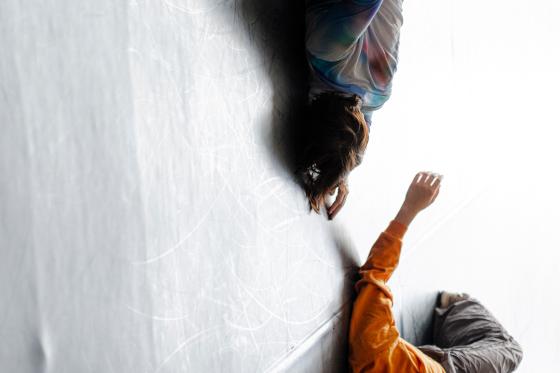
Abendprogramm Inge Gappmaier "now"
brut all over Vienna
brut nordwest
accessible
Nordwestbahnstraße 8-10, 1200 Vienna
Subway: U1, U2 (Praterstern), U4 (Friedensbrücke), U6 (Dresdnerstraße) Tram: 5 (Nordwestbahnstraße) Bus: 5A (Wasnergasse)
accessible
studio brut
not accessible
Zieglergasse 25, 1070 Wien
Subway: U3 (Zieglergasse), Tram: 49 (Westbahnstraße / Zieglergasse)
not accessible
Bears in the Park Art Place
not accessible
Eyzinggasse 12, 1110 Vienna
U-Bahn: U3 (Gasometer) Bus: 72A (Gasometer), 76A, 76B (Simoningplatz)
not accessible
WUK performing arts
barrierefrei
Währinger Straße 59, 1090 Vienna
Subway: U6 (Währinger Straße / Volksoper), Tram: 40, 41, 42 (Währinger Straße / Volksoper), 5, 33 (Spitalgasse), 37, 38, 40, 41, 42 (Spitalgasse / Währinger Straße)
Der Betrieb
accessible
Vogelweidplatz 13, 1150 Wien
Subway: U6 (Burggasse-Stadthalle) / Bus: 48A (Moeringgasse) / Tram: 9 (Camillo Sitte Gasse)
